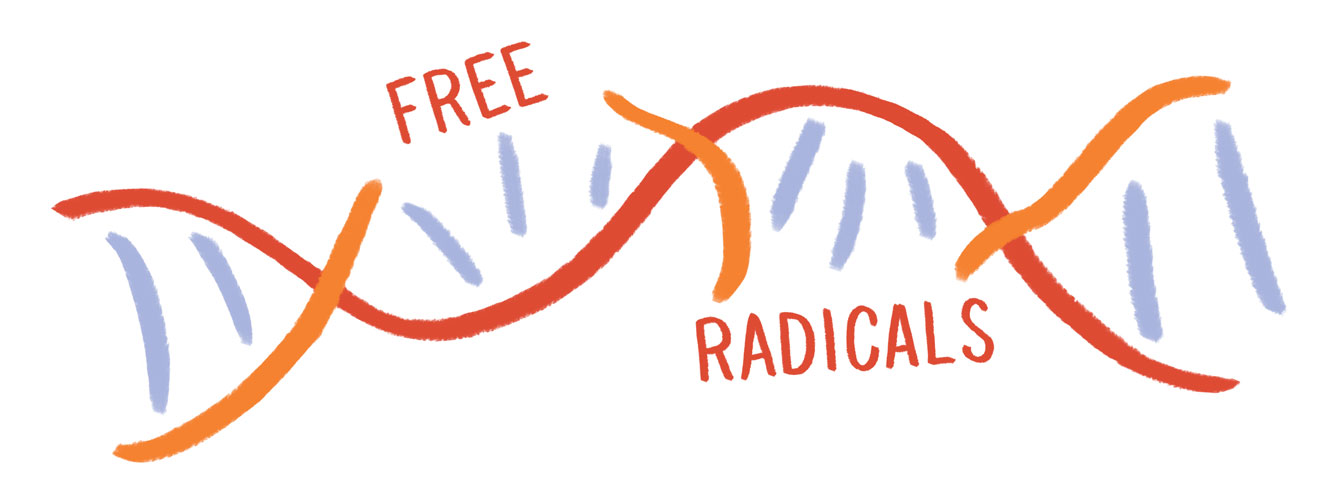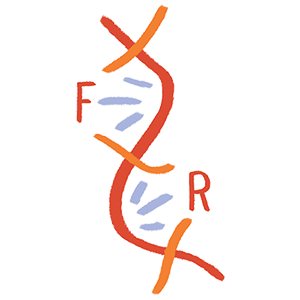
A group of community members including scientists and researchers, look disapprovingly at President Trump who tries to shield himself from their collective gaze. Artwork by Mariah-Rose Marie M .
As members of the Free Radicals collective, we are writing in response to the recent U.S. government memo that attempts to define gender and sex as binary. We voice solidarity with the truth of trans, gender nonconforming (gnc), and intersex peoples’ lived experiences over allegedly objective science. Not only do we assert that the memo goes against prevailing research, but we also denounce the weaponization of science to justify oppression. This is a tactic repeated throughout history, and reflected in how institutional science is funded and who gets to perform and access it.
The memo peddles biological determinism and falsely suggests that there is consensus within institutional science on what constitutes gender and sex. In fact, existing science challenges the widespread belief that there are two discrete categories of people: female and male. Research demonstrates that gender and sex consist of multiple biological and psychological dimensions, each of which exist dynamically in a continuous range. Importantly, no scientific metric to date (i.e. chromosomes, bodily characteristics, hormones, brain structure, behaviors) can determine one’s sex or gender in a reliable manner. Despite this, clinicians insist on gender and sex assignment at birth based on arbitrary standards for genital anatomy, beginning the societal policing of gender and sex that can culminate in interpersonal, medical, and political violence against those whose do not conform strictly to the binary model.
Furthermore, science has historically been and continues to be a flawed measure for “truth,” and what does gets published as scientific literature is by no means a comprehensive authority on human experience. Science as we know it today developed in tandem with European imperialism: imperial powers backed experiments justifying racialized and gender-based violence that increased their profits. The legacy of this relationship still permeates institutional science today. For example, the majority of research relies on normative assumptions about gender and sex that perpetuate stereotypes about the myth of the gender/sex binary. What we consider to be sociocultural (gender) and biological (sex) are in reality both influenced by social and biological factors. But scientific research largely groups people into “male” or “female” categories without nuanced evaluation of each of these dimensions, leading to limited knowledge about the true range of gender and sex diversity in humans. Indeed, hundreds of thriving human societies around the world and throughout history have recognized more than two genders.
Normative biases also extend to the systems that govern the production of scientific knowledge: between 1989 and 2011, 0.03% of the 127,798 published NIH-funded studies specifically focused on trans people. Within the scientific community, senior scientists actively discourage research on LGBTQ health, contributing to hostile environments for trans, gnc, and intersex scientists that place limitations on research by and for trans, gnc, and intersex people. Even when research studies include trans, gnc, and intersex people, cisgender scientists are often at the helm, leading to damaging mischaracterizations and misconceptions that validate dangerous tropes and gatekeeping of trans identity. Those who fund — and therefore get to do — institutional science ultimately shape the curation of ‘facts’ and ignorance about trans, gnc, and intersex people.
Thus, institutional research is only one, imperfect methodology for studying the world, and should not be required to validate people’s humanity and fundamental rights. Given the dearth of institutional research by and for trans, gnc, and intersex people, many communities have conducted their own research (see resources below). We assert that trans, gnc, and intersex people are the experts of their own bodies, lives, and identities. We all understand our bodies in different ways, and these understandings influence our definitions of wellness, health, and how we need to exist in the world. Biomedical research institutions and healthcare providers must start with empowering folks to achieve their unique needs. People’s lived experiences, after all, are empirical data. They *are* science.
The stakes are enormous. Violence against trans, gnc, and intersex people occurs in all contexts — at home, school, and work, on the streets, in the doctor’s office, and in the hands of the state. Trans people, particularly Black and Brown trans people, face disproportionately high levels of physical and sexual violence. So far, at least 22 murders of trans folks have been reported in 2018. The majority of those murdered have been Black women. Further, intersex people have been excluded and deeply harmed by unethical and dehumanizing research and medical practices that are nonconsensual, unnecessary, invasive, and traumatizing. Institutional science does not exist in a vacuum; it plays a role in perpetuating violence against trans, gender nonconforming, and intersex people by upholding societal beliefs that certain bodies and identities are more real than others.
We must not lose sight of what’s most important: the rights of trans, gnc and intersex people to be safe, to thrive and to define who they are and what they need for themselves. This is a matter of being on the side of oppression or being on the side of those marginalized by violent power structures. It is a matter of believing in the agency, wisdom and full range of beauty in fellow humans.
RESOURCES:
Immediate actions/ ways to engage:
- If you are a MA resident: Vote YES on Question 3 on the ballot on Tuesday, November 6.
- Donate to crowdfunding campaigns to directly support trans folks in need of immediate assistance.
- Out Magazine lists these trans-led organizations to follow and donate money and time to: Sylvia Rivera Law Project, Audre Lorde Project, Casa Ruby, FIERCE, Trans Latin@Coalition, Trans Lifeline, Familia: Trans Queer Liberation Movement, Southerners on New Ground, Organizacion Latina de Trans En Texas (OLTT), Trans Law Center. For more comprehensive lists, visit: Trans Justice Funding Project and Borealis Philanthropy’s Fund for Trans Generations.
- Trans folks, especially Black and Brown trans folks, are targeted for violence and abuse by police. Give to bailout funds like the Bronx Freedom Fund, Lorena Borjas Community Fund, Philadelphia Bail Fund, Chicago Community Bond Fund, Tranzmission Prison Project.
- Learn more about intersex and differences in sex development (DSDs), donate to intesex/DSD organizations such as InterACT, IC4E, ISNA, AIS-DSD support group, Accord Alliance.
- Advocate for a culture shift around intersex rights in scientific and medical practices that prioritize the humanity and well-being of intersex people, and contact your legislators to request their support of intersex human rights issues.
- Support and/or attend a Transgender Day of Remembrance event on November 20.
- Sign up for an LGBTQ prison pen pal with Black&Pink or volunteer to process mail and answer letters from inmates with the TGI Justice Project in San Francisco, CA.
- Many resources exist on knowing rights or best practices for supporting trans people in healthcare, immigration, etc. in particular localities as well as toolkits and case studies on successful campaigns to expand LGBTQ rights in areas such as reproductive health or fight back against criminalization that provide helpful analyses for your own work. The organizations that create these toolkits are also on the frontlines and could use volunteer support.
- Educate yourself on the history of science, scientific racism, and institutionalized oppression in science as well as community research that is being done outside of academia (resources are provided below). Have conversations with others about these things.
- For practicing scientists: interrogate the biases that pervade your research and your institution; develop a critical eye for science that appears to uphold systems of power and oppression; ask research questions that have been historically neglected or understudied and that challenge the status quo.
Community-led/based research:
- It’s War In Here: A Report on the Treatment of Transgender and Intersex People in New York State Men’s Prisons by the Sylvia Rivera Law Project
- We deserve better: A report on policing in New Orleans by and for queer & trans youth of color
- Coming out of concrete closets: A report on Black&Pink’s national LGBTQ prisoner survey
- A Census of Our Own: The State of Queer Southeast Asia America by the Providence Youth Student Movement
- What’s Your Issue? Participatory Action Research done by folks at CUNY with LGBTQ & GNC youth
More on sex/gender and science:
- A zine illustrating the nuances of gender/sex and sexuality
- How scientific (mis)understandings of gender/sex lead to policy ramifications
- Systemic flaws and biases in sex differences research
- Some ideas for doing gender/sex in science
- Resources for teaching biology with social and political context.
- Statement from institutional scientists opposing the administration’s gender definition memo
- “US proposal for defining gender has no basis in science” via Nature
- “The Trump Administration says it wants to define sex ‘on a biological basis.’ It gets the science wrong.” via Washington Post
- “Why ‘Unchangeable’ Definitions of Sex Based on Genitals are Wrong, According to Science” via ScienceAlert.
- Introduction on why the idea of two sexes is simplistic, via Nature
- Twitter thread on why biological sex is a spectrum
- How Transphobia Gets Written into Science and Medicine, via Free Radicals
- Biologist Rachel Levin Talks Transgender Research, Scientific Literacy, and Being an Activist-Scientist, via Free Radicals
- Evolution’s Rainbow, a book on sexual diversity in nature by Joan Roughgarden
History of science/science as a tool of oppression:
- Chanda Prescod-Weinstein’s decolonising science reading list
- Dorothy Roberts’ work on scientific racism and its contemporary edition
- When (flawed) ancestry testing is given authority over indigenous narratives







